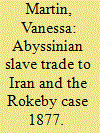| Srl | Item |
| 1 |
ID:
183753


|
|
|
|
|
| Summary/Abstract |
In March 1877, the British searched a ship named The Rokeby and discovered eight Abyssinian child slaves on board. It is argued that, hitherto frustrated by the constant evasion of their attempts to supress the slave trade, they used the event to bring pressure on local government officials and merchants of Bushehr to cease their collusion and involvement. The result was a decline in the trade at least in the coast around Bushehr. There having been hitherto no specific studies of the Abyssinian slave trade to Iran, the case has also been taken as an opportunity to discuss it from its country of origin through Mecca and Jeddah, then in Ottoman territory, and to the Gulf ports of Iran, which allows an indicative comparison of Ottoman and Iranian policies of suppression. Rare insight has been provided into the experiences of the slaves themselves by the first-hand accounts of their journeys from Abyssinia given to the British.
|
|
|
|
|
|
|
|
|
|
|
|
|
|
|
|
| 2 |
ID:
099369


|
|
|
|
|
| Publication |
2010.
|
| Summary/Abstract |
Most of the reports about the reaction of the Ethiopian regime to the blow that it suffered in the 2005 elections focus on its institutional evolution, and conclude that it took a turn towards even stronger authoritarianism. Observations made in a rural community in south-east Amhara State reveal that it reacted first, until the end of 2009, by a whole range of the deepest reforms since its takeover in 1991. These combined a stronger grip of the ruling party in all areas with a 'liberalisation' of the rural development strategy and first steps towards local 'good governance'. They were embodied in the rise of the traditional rural elite which had been ostracised for years, as if the regime was trying to build its new constituency on it. But at the end of 2009 the local authorities suddenly returned to the all-encompassing authoritarian attitude characteristic of the pre-2005 period. This 'liberalisation' could thus be seen as merely a tactical interlude, conceded by a ruling party still driven by its Leninist legacy and the Abyssinian 'culture of power'.
|
|
|
|
|
|
|
|
|
|
|
|
|
|
|
|